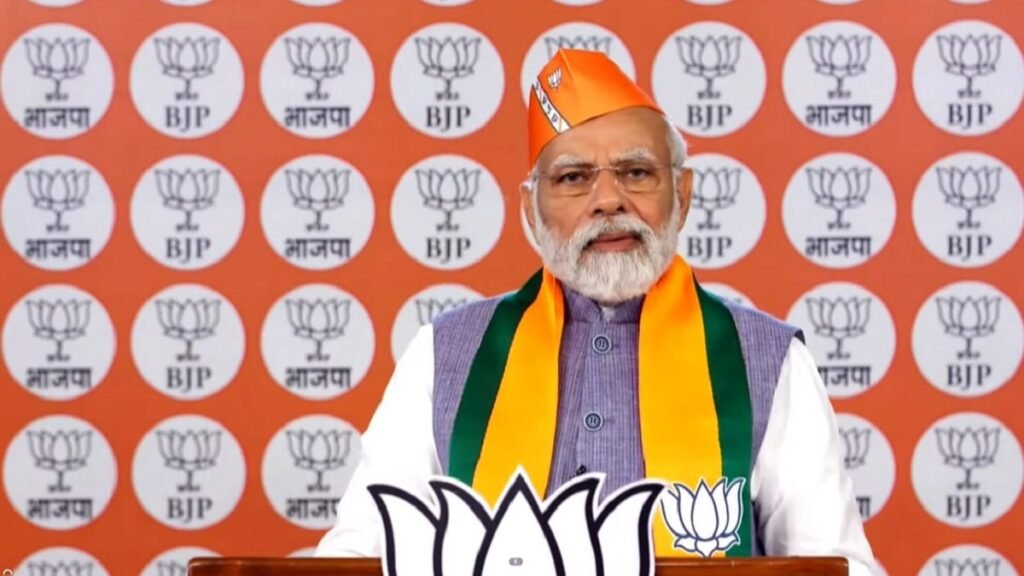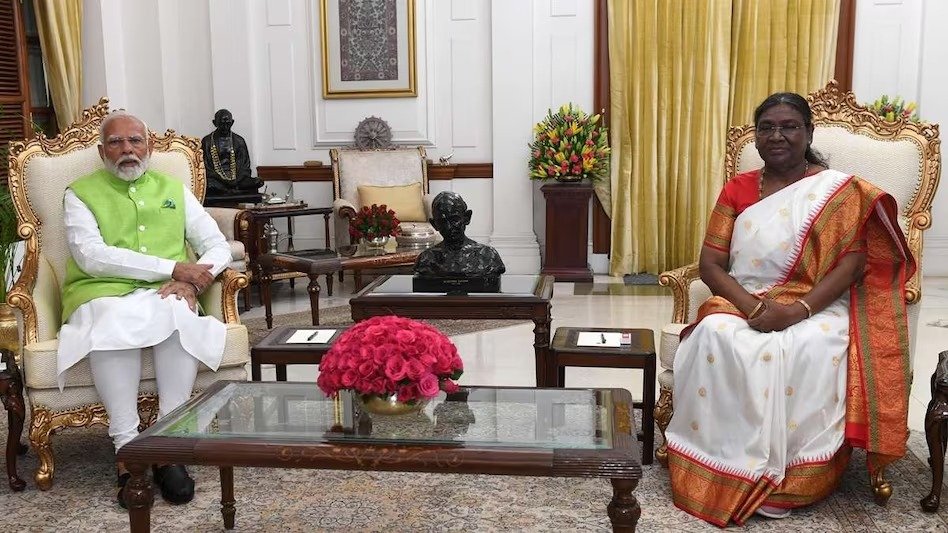President Murmu Invites PM Modi to Form a New Government
Narendra Modi Invited to Form New Government
President Droupadi Murmu has formally invited Prime Minister Narendra Modi to form the next union government after the National Democratic Alliance (NDA) secured a victory in the 2024 Lok Sabha elections. Modi, along with his new cabinet, will be sworn in on June 9 at 7:15 PM, as announced by Rashtrapati Bhavan. This invitation comes under Article 75(1) of the Constitution, which empowers the President to appoint the Prime Minister.
Article 75(1) and Prime Minister Appointment
Under Article 75(1) of the Indian Constitution, the President appoints the Prime Minister, who is then required to advise on the formation of the Union Council of Ministers. Following the recent election results, President Murmu requested Modi to provide the names of his cabinet members and finalize the details of the swearing-in ceremony.
Modi’s Leadership and NDA Support
Narendra Modi, aged 73, was unanimously chosen as the leader of the NDA’s newly elected MPs. His nomination, proposed by Defence Minister Rajnath Singh, underscores his leadership within the coalition. Modi highlighted the NDA’s commitment to upholding constitutional values and the spirit of coalition politics. A delegation led by BJP President JP Nadda met the President, submitting letters of support for Modi from NDA constituents.
Official Statement from Prime Minister-designate Modi
Speaking outside Rashtrapati Bhavan, Modi emphasized the formation of a strong, stable, and growth-oriented government. He assured that the new government would address the aspirations of the people and work towards rapid national development. Modi expressed confidence that the stable government would benefit India’s economy and youth.

Why This News is Important
Significance for Government Exam Aspirants
This event marks a significant moment in Indian political history, reflecting the democratic process and constitutional procedures. Understanding the roles and responsibilities outlined in the Constitution, such as Article 75(1), is crucial for students preparing for government exams like IAS and PCS.
Implications for Policy and Governance
The formation of a new government under Modi’s leadership will shape policy and governance for the next five years. Aspirants for civil services, police, and defense positions must stay informed about the government’s priorities and initiatives, which can impact various sectors including education, law enforcement, and public administration.
Understanding Coalition Politics
Modi’s reappointment highlights the dynamics of coalition politics in India. For banking and railway exam candidates, grasping the nuances of political alliances can provide deeper insights into the functioning of the Indian political system and its impact on governance and policy-making.
Insights into Leadership and Governance
Modi’s emphasis on a stable and growth-oriented government offers lessons in leadership and administrative strategy. Candidates for teaching and civil service positions can draw on these insights to understand effective governance and public service delivery.
Impact on Economic and Social Policies
Modi’s assurance of rapid national development is particularly relevant for aspirants in the banking sector. Analyzing government policies aimed at economic growth can help candidates prepare for questions related to economic planning and financial regulations in their exams.
Historical Context
Previous Lok Sabha Elections
The 2024 Lok Sabha elections were a significant event, following the previous general elections held in 2019, where the BJP also secured a majority. Understanding the election history helps in analyzing the political trends and voter behavior over time.
Role of the President in Government Formation
Historically, the President of India plays a crucial role in government formation post-elections. This tradition dates back to the first general elections in 1952, establishing a precedent for the constitutional process followed today.
Coalition Governments in India
The concept of coalition governments in India has evolved over decades, especially since the late 1980s and 1990s. This historical perspective helps in understanding the significance of the NDA’s coalition politics and its impact on stability and governance.
Modi’s Political Career
Narendra Modi’s political journey, from his tenure as the Chief Minister of Gujarat to his role as Prime Minister since 2014, provides a backdrop to his leadership style and policy decisions. This history is crucial for understanding his impact on national and international politics.
Constitutional Amendments and Reforms
The Indian Constitution has undergone various amendments to adapt to changing political and social landscapes. Key amendments relevant to the powers and functions of the Prime Minister and President are essential knowledge for government exam aspirants.
Key Takeaways from Modi’s Invitation to Form a New Government
| Sr. No. | Key Takeaway |
|---|---|
| 1 | President Droupadi Murmu has invited Narendra Modi to form the next government after the NDA’s victory in the 2024 elections. |
| 2 | Modi’s invitation is under Article 75(1) of the Indian Constitution, which outlines the President’s power to appoint the Prime Minister. |
| 3 | Modi was unanimously elected as the leader of the NDA’s newly elected MPs, reflecting strong coalition support. |
| 4 | Modi emphasized forming a stable, growth-oriented government to address national aspirations and development. |
| 5 | Understanding the constitutional process and political dynamics is crucial for government exam aspirants. |
Important FAQs for Students from this News
Q1: What is the significance of Article 75(1) in the Indian Constitution?
A1: Article 75(1) empowers the President of India to appoint the Prime Minister and, on his advice, the Union Council of Ministers. This article is crucial for the formation of the government post-elections.
Q2: When is the swearing-in ceremony for the new government led by Narendra Modi scheduled?
A2: The swearing-in ceremony is scheduled for June 9 at 7:15 PM.
Q3: Who proposed Narendra Modi’s name for the leadership of the NDA?
A3: Defence Minister Rajnath Singh proposed Narendra Modi’s name for the leadership of the NDA.
Q4: What was Modi’s main assurance after being invited to form the new government?
A4: Modi assured the formation of a stable, growth-oriented government that will address national aspirations and work towards rapid development.
Q5: Why is understanding coalition politics important for government exam aspirants?
A5: Understanding coalition politics is important because it offers insights into the functioning of the Indian political system, which is crucial for exams focusing on governance and public administration.
Some Important Current Affairs Links


